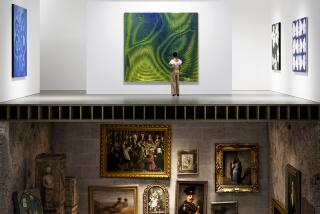BERNHARDT CLASSIC LAUNCHES PARAMOUNT SERIES
- Share via
The Los Angeles County Museum of Art’s eight-month “Paramount Pictures: 75 Years of Film History” begins at 8 p.m. Friday in Bing Theater with “Queen Elizabeth,” starring Sarah Bernhardt. This was the 1912 French production that not only was to launch Paramount, thanks to the gambling instincts of ex-furrier Adolph Zukor, but also was to introduce American audiences to the multireel feature.
Alas, the value of the 38-minute “Queen Elizabeth,” which Bernhardt saw as “my one chance at immortality,” is strictly historical. Resolutely a filmed play--it was shot in Madame Bernhardt’s own Paris theater--it shows the Divine Sarah flailing about in elaborate costumes as she expresses her grief over the treachery of her beloved Essex (handsome Lou Tellegen) in the most extravagant stock company manner possible.
You can imagine that on the stage, even at 66, Bernhardt remained a vital personality, but there’s not a shred of evidence here of her celebrated greatness as an actress. But “Queen Elizabeth” remains a landmark as the film that helped make the flickers respectable and paved the way for the feature-length film.
With “Queen Elizabeth” is Cecil B. DeMille’s “The Ten Commandments” (1923). You can understand why DeMille remade his first religious spectacle 33 years later, for in the original version, the Old Testament drama is confined to a prologue that is a timelessly awesome, if simplistic, retelling of the Exodus, followed by a modern-day tale heavily contrived as a morality play illustrating the evils that befall those who disobey the Commandments.
The prologue has tremendous sweep and scale, as Moses (Theodore Roberts) parts the Red Sea, leading his people out of Egyptian bondage only to lose them to the orgiastic worship of the Golden Calf. (This may be the first flowering of DeMille’s sure-fire blend of religious piety and salaciousness.) But the morality play is another matter, a dated and lurid melodrama about the inevitable comeuppance of a ruthless young San Francisco contractor (Rod La Roque). Yet there is pertinence in the remark of the contractor’s brother to their ultra-religious mother, “You carry a cross in your hand, but you use it like a whip.”
In its overheated way, the contemporary portion of the film does capture the anguish of countless American families in the 1920s as parents and children struggled to reconcile Victorian values with the good-time frenzy of the Flapper Era. The presence of radiantly beautiful Leatrice Joy as the contractor’s vivacious wife is immensely helpful.
Saturday brings “The Sheik” (1921), in which Rudolph Valentino, eyes rolling and nostrils flairing, carries off Agnes Ayres to his tent in a famous moment. Ayres is playing a headstrong British woman who daringly disguises herself as a slave girl and attends a fete that Ahmed Ben Assan (Valentino) is holding at a casino in a desert village.
Some extravagant emoting aside, Valentino has a magnetic screen presence that defies the passing of time and fashion. Well directed by George Melford, “The Sheik” is too romantic to be really offensive in the light of the women’s liberation movement; its particular sin is racism, for Ahmed Ben Assan is at last revealed to be of English and Spanish ancestry so as to make his eventual winning of Ayres more acceptable to audiences of the day. Playing with it--but not available for preview--is DeMille’s “Joan the Woman” (1916), starring Geraldine Farrar.
“Seven Classic Films from Russia,” scheduled at 8 p.m. Tuesdays at the County Museum of Art through July, commences with “Andrei Roublev,” the late Andrei Tarkovsky’s dazzling 1966 epic on the life of Russia’s greatest icon painter.
In this beautiful, harrowing and mesmerizing spiritual odyssey, Tarkovsky suggests that man ever wants to soar, yet everything conspires to bring him down. Nevertheless, by its end, this three-hour masterpiece has become a profound affirmation of the spirit in the face of truly awesome adversity.
Significantly, Tarkovsky has said, “I do not understand historical films that have no relevance to the present.”
Tarkovsky thrusts us into early 15th-Century Russia in all its harshness, cruelty and raw beauty as the artist-monk Roublev (Anatoly Solonitsyn) expresses in his paintings his tortured search for God in man.
Information on the Paramount and Russian series: (213) 857-6010.
More to Read
Only good movies
Get the Indie Focus newsletter, Mark Olsen's weekly guide to the world of cinema.
You may occasionally receive promotional content from the Los Angeles Times.










